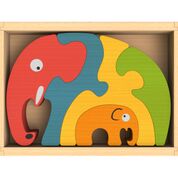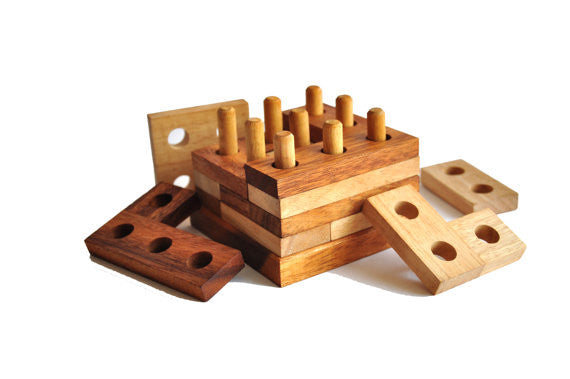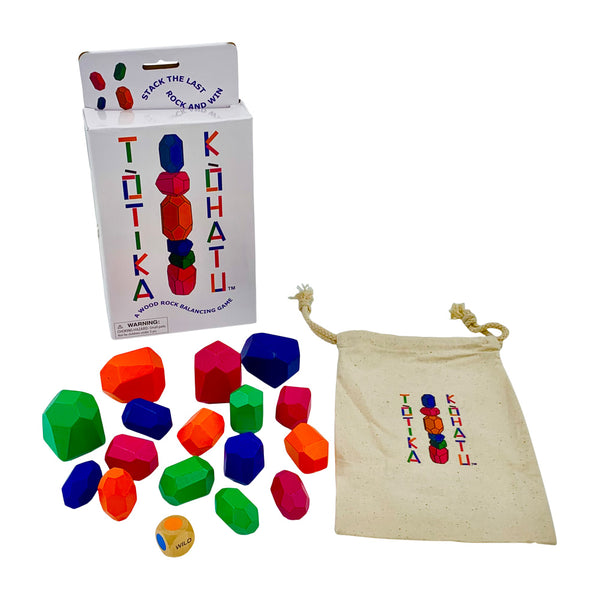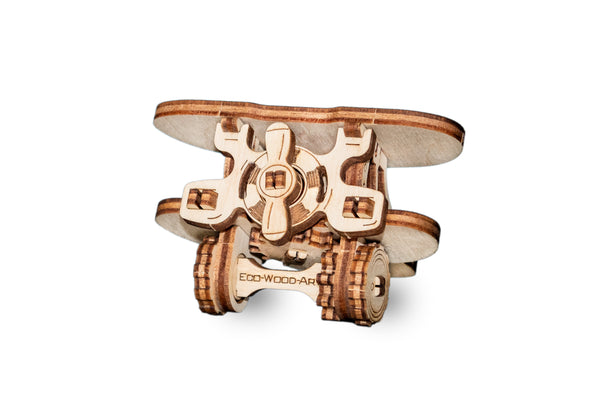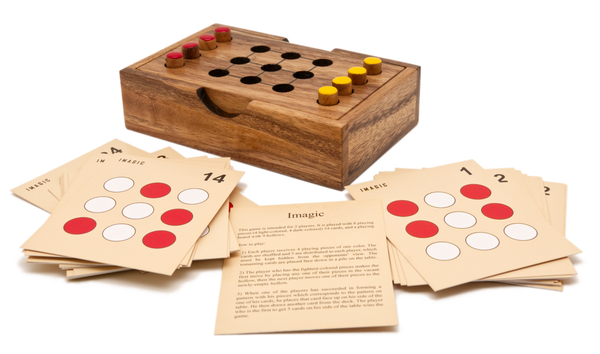Elephant Family Puzzle
Sold Out
The Elephant Family Puzzle is a great first puzzle and helps develop fine motor and problem solving skills. Easy clean up with the wooden storage box that is included. This puzzle is beautifully crafted from sustainably harvested rubber wood and finished with water based stains. Ages 2+
Related Items
Imagine Wooden Puzzle Brain Teaser
$21.99
Imagine Wooden Puzzle Brain Teaser
The Imagine game is the new challenge for those who love Cube Puzzle
The goal is to put back all the different pieces in the cube.
Also really good for children. They can create, imagine what they want!
Totika Kohatu - Woods Rocks Stacking Balance Game
Sold Out
Totika Kohatu is a traditional Maori competition played by stacking stones as high as possible on beaches, near rivers or other places with rocks. Totika Kohatu is a tabletop wood rock stacking game that will determine, once and for all, who has the steadiest hand and nerves of steel. Knock the stack over on your turn and lose that round of play.
Four card decks, each with over 150 questions, including Self Esteem, Life Skills and Anger for ages 8 and up plus the Early Childhood Social Emotional deck for ages 4-7. The drawstring game bag holds all four decks, the 16 Kohatu stones plus a game dice. Choking hazard not appropriate for under age 3.
- Players take turns rolling the die and balancing one rock of the rolled color on top of the stack. Knock over the stack and lose that round of play. Stack the last rock and win. Win a round by successfully stacking the 16th stone. Sounds easy until everyone realizes stacking all 16 stones is nearly impossible but believe us, it’s possible. Don’t give up. Keep practicing and build your skills.
- Although it looks simple at first, the difficulty of stacking all 16 rocks, stones and gems becomes apparent and players are gradually mesmerized by the surprising height of the stack, much more mindful of their movement around the table as the stack grows taller and excitement builds.
- Totika Kohatu wood rocks are irresistible and they are going grab and hold the attention of children, teens and adults. No set up and each round is quick, 3-5 minutes without the question cards and 5-15 minutes when using question cards. Four card decks, each with over 150 questions, including Self Esteem, Life Skills and Anger for ages 8 and up plus the Early Childhood Social Emotional deck for ages 4-7.
- Includes: The drawstring game bag holds all four decks, the 16 Kohatu stones: 4 large stones, 8 medium rocks, 4 small gems and plus a game dice. Choking hazard not appropriate for under age 3.
- Instructions and improved, non-glossy blank cards that are very easy to write on and to erase pencil.
Mini Plane Kit
$16.50
Small fidget plane to assemble. The propeller turns when the wheels turn. Great beginner's project to reduce stress or as a holiday ornament. Can be painted with thin water-based paints, except the gears, not to obstruct the mechanisms.
Eco-friendly sustainable material made of FSC-certified wood.
- Very high precision with laser-cut plywood with amazing details.
- All-inclusive boxes, self-assembly.
- No messy glue is required.
- Clear colorful step-by-step assembly instructions.
Watch these tips before starting: https://youtu.be/vCtTfemvE1M
Imagic
$21.99
This Imagic strategic game is intended for 2 players. It is played on board with 9 hollows. It includes 8 pegs (4 yellow and 4 red) and 34 cards.
How to play:
1) Each player receives 4 playing pieces of one color. The cards are shuffled and 5 are distributed to each player, which must be kept hidden from the opponents’ view. The remaining cards are placed face down in a pile on the table.
2) The player who has the lightest-colored pieces makes the first move by placing any one of their pieces in the vacant hollow, then the next player moves one of their pieces to the newly-empty hollow.
3) When one of the players has succeeded in forming a pattern with his pieces which corresponds to the pattern on one of his cards, he places that card face up on his side of the table. He then draws another card from the deck. The player who is the first to get 5 cards on his side of the table wins the game.

